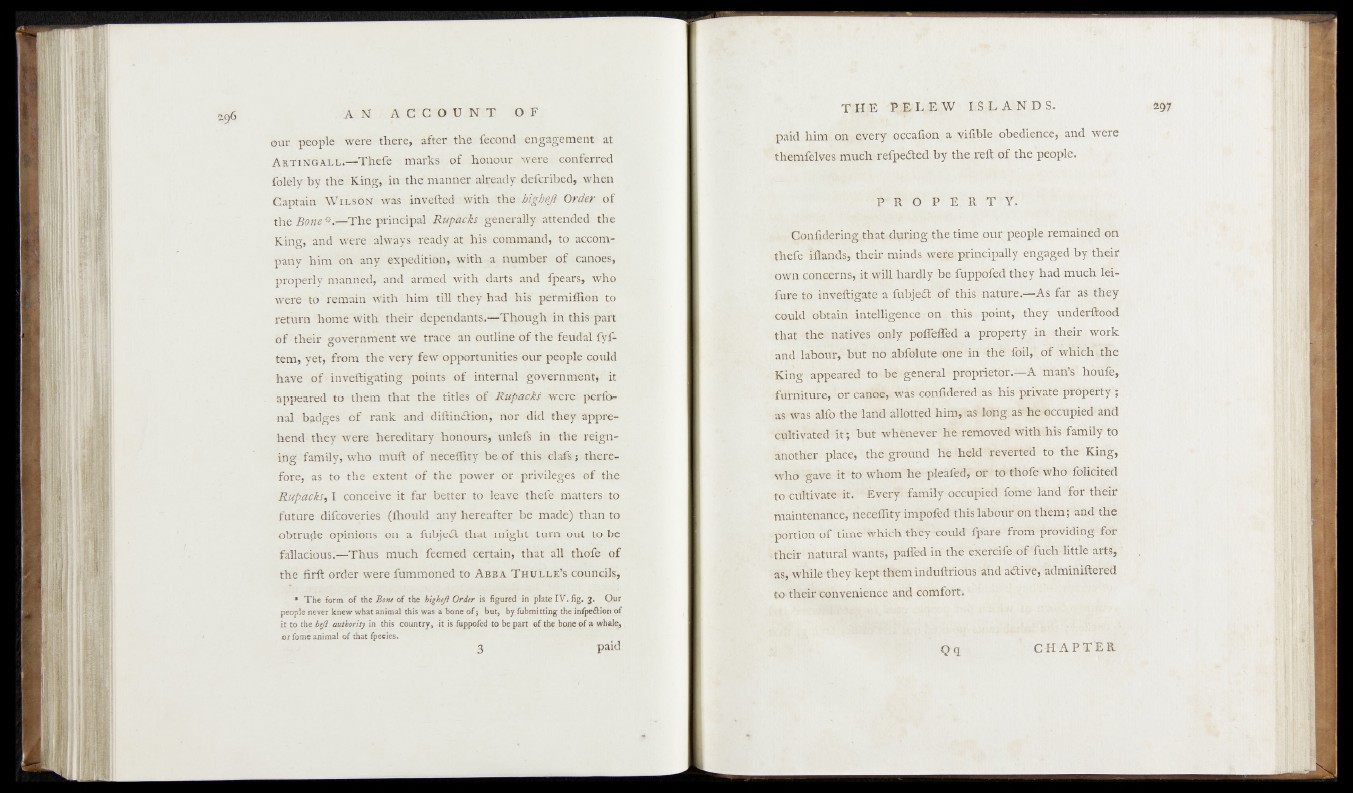
our people were there, after the fecond engagement at
A rtingal L.-r-Thefe , marks of honour were conferred
folely by the King, in the manner already deferibed, when
Captain W ilson was invefted with the bigbefi Order of
the Bo^g ^.—^The principal Rupacks generally attended the
King, and were always ready at his command, to accompany
him on any expedition, with a number of canoes,
properly manned, and armed with darts and fpears, who
were to remain with him till they had his pereaiffioa to
return home with their dependants.—Though in this part
of-their government we trace an outline of the feudal fyf*
tem, yet, from the very few opportunities our people could
have of * inveftigating points of internal government* it
appeared to them that the titles of Rupacks were perfc-
nal badges of rank and diftindtion, nor did they appre-
hend- they were hereditary honours, pnlefs in the reign-
ing family, who muft of necefljfy be bf this; dafej therefore,
as to the extent of the power or privilege's of the
Rupacks, I conceiye it' far better to leave thefe matters,to
future difcoveries (fhould any hereafter be made) than to
obtrude opinions on a fubjedt that might turn out to be
fallacious;—Thus much feetned certain, that dll thofb of
the firft order were futnmoned to Abba Thulle’s councils,
* The form of the Bone of the b ig h e jl Order is figured in plate IV. fig. 3. Qnr
people never knew what animal this was a bone o f; but, by fubmitting the infpedtion of
it to the h e ji a u th o rity in this country, it is fuppofed to be part of the bpne of a whale,,
or fome animal of that fpecies. 3 paid
paid him, on-{ every pecafion/a vifible-obedience, and were
themfelves muchtrefpedted, by the reft of the people., J
F R O P E, R T W. !
Confideringtbat-d^rln^the^me pur; peopleremakied<qn
thefe^ lfkmds, their mirti^w^fc principally engagedvbyvtheit
own concerns, it will hardly be fuppofed they had much lei-
fure tp invejfti’g'at^.-i fubjedt of this; nature.—A^f^aptbey
cosuld obtain intelligence on, this, point-,r ^ i y underload
that the natives only poifeifed,ajj|propertyvin .their.work
and laboifr, but no ■ abMute^ne in -the c& 'wéMh .4the
King appeared to btf/gfcneral-proprietor.— A ’ mails' hoüTe,
fhfniture, or canoes, wds-confidered as' his private property ;
as Was alfo the land allotted him^a&lèfogi as^bef cOupied* and
cultivated i t ; but whenever "he removed withlhis fatnil^ to
Another place, the^gronnd he held 'revetted to- thé'1 hirig,
who* -gave ft %to whom he pleafëdyof Td^ófo whö folickëd
to -cuftivate 1 it. ' Every family ocuufufeïi lome' land -for thëif
maintenance, neceffity ïmpofèd: thïs labbiihbn'them;'ancl. the
.portion;of time-Miich tft&yxould fpare from'providifig; fof
their natural Wants, pafled in thé fexeróhe^fueh*"Me arts',
a s 3 wb 11 p.-they-kept-them influftfiohs khd adiivë*admihiftefeü
to their convenience and comfort-. I '
Q q CHA P T ER